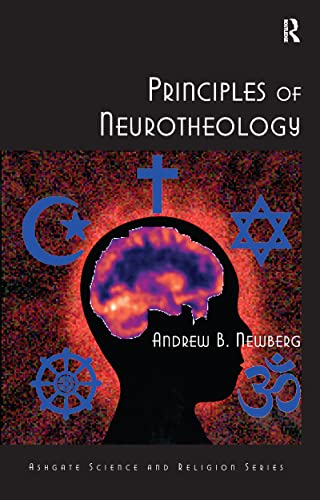Principles of Neurotheology
Written by Andrew B. Newberg Reviewed By Derrick L. HassertPrinciples of Neurotheology continues Andrew Newberg's earlier work investigating the intersection of neuroscience and religious practice. Newberg is a physician with board-certifications in Internal Medicine and Nuclear Medicine and research interests in neuroscience, and he currently serves as the Director of Research at the Myrna Brind Center for Integrative Medicine at Thomas Jefferson University Hospital and Medical College in Philadelphia. His experimental work with the late Eugene D'Aquili (summarized in 1999's scholarly The Mystical Mindand 2001's arguably more popularizedWhy God Won't Go Away) examines the neurological correlates of religious meditation as uncovered by advanced neuroimaging techniques. Principles, Newberg's most recent work, follows in the grand tradition of natural theology, attempting to understand ultimate things by examining the functioning of the natural world. Newberg defines this burgeoning area of “neurotheology” as “a unique field of scholarship and investigation that seeks to understand the relationship specifically between the brain and theology, and more broadly between the mind and religion” (p. 1). This definition implies that this field would encompass not only the relationship between neuroscience and religion (such as the study of the neurological underpinnings of religious practice), but would also seek to ground the study of psychology and religion in the knowledge of the working brain. For Newberg, the goals of scholarship within neurotheology are not only to improve understanding of the workings of the human mind and brain as they relate to religion and theology, but also to improve the human condition in the contexts of health, wellbeing, religion, and spirituality (p. 18). As such, the discipline of neurotheology seeks to occupy a central place in discussing essential topics that connect findings in brain science to religion and theology.
While Newberg is obviously well-versed in a variety of religious backgrounds, he appears to have a more idealized view of the “Eastern” religions in comparison to religions originating in the West, namely, Judaism and Christianity. Scholars and theologians of various Christian traditions, in particular those from more orthodox and evangelical communities, may take issue with his presentation of ideas held to be foundational for the Christian faith. Philosophers such as Aristotle and Saint Thomas Aquinas—whose writings and ideas have historically had a profound influence on Christian considerations of personhood and human nature—are given only superficial consideration as to how their ideas may relate to psychology and neuroscience. One irksome penchant that Newberg continually engages in is speaking of the brain as though it were a whole person. At various points in the text, Newberg speaks of the brain perceiving, convincing, reasoning, assuming, believing, preferring, etc. The use of such language implicitly reduces the human person to the workings of the brain, whether Newberg intends this reduction or not: A person believes in God; a brain does not. At other times Newberg uses more neutral language, speaking of the neurological substrates of various experiences. It is unclear as to whether Newberg is aware of the philosophical and religious implications of these distinct ways of employing language when speaking of human capacities and their relationship to the brain. While he explicitly rejects reducing religion to neuroscience, Newberg makes overly reductionist assumptions and assertions throughout the book; he regularly attributes differences between individuals to brain differences and not experience, reasoning, or logic.
As a work of scholarship, Principles is daunting in its scope and impressive in its content. Newberg seeks to address a topic of importance to all cultures and peoples. Given that this field of inquiry is in its infancy, Principles is obviously meant to lay the groundwork for Newberg's idealized vision of what such a field would look like in a more mature form, rather than simply summarize extant work in the field. Noting Newberg's previous experimental and theoretical labours in this discipline, he is arguably one of the most qualified to attempt to elaborate upon such a set of foundational principles. However, the number of principles he lays out—54 in all—is somewhat overwhelming, and the range of content presented in those principles is perhaps too extensive and becomes increasingly abstract as the list goes on. For example, Principle XVII is “The brain places functional restrictions on all thought processes, and hence how we experience religion, spirituality, and theology,” while Principle XLIX is “Neurotheology should strive to understand the meaning of salvation, by asking, from both the biological and theological perspectives, how the human person can be saved.”
Despite its faults, Principles has much to recommend it. It provides the reader with a broad overview of cutting-edge brain research related to religious experience, and its principles—if the text is widely disseminated—are likely to provoke a good deal of discussion and debate. The text's possible faults are directly related to its strengths: in seeking to do so much, it often says too much and opens the door to valid criticisms from the fields of theology and philosophy. However, the theological and philosophical responses and clarifications that the text provokes may, in and of themselves, be worth Newberg's formidable effort.
Derrick L. Hassert
Derrick L. Hassert
Trinity Christian College
Palos Heights, Illinois, USA
Other Articles in this Issue
Evaluating a new English translation of the Bible can be extremely difficult...
In the November 2009 edition of Themelios, Dane C...
Jonathan Edwards (1703-1758) is remembered today as a saint, scholar, preacher, pastor, metaphysician, revival leader, theologian, Calvinist—the list goes on...
Almost two decades ago I wrote an essay titled " When Is Spirituality Spiritual? Reflections on Some Problems of Definition ...
He was the youngest son of elderly parents. His childhood was secluded and unhappy, which might in some measure account for his lifelong melancholy...






